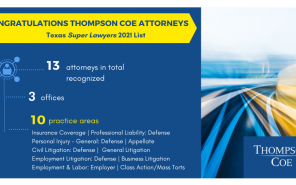Michael Eady Argues Before Georgia Supreme Court
May 24, 2023
Thompson Coe partner Michael Eady argued before the Georgia Supreme Court on May 16, 2023 on behalf of Ford Motor Company, addressing two certified questions from the U.S. District Court, Northern District of Georgia:
- Is reckless a standalone exception to the statue of repose, O.C.G.A. § 51‑1‑11(c)?
- If so, how is reckless conduct defined?
Background
A product liability statute of repose extinguishes a cause of action after a set period of time. In Georgia, the period is 10 years from the date of first sale, but there is an exception in certain situations. In 1994, the Georgia Supreme Court construed the exception – when the manufacture’s conduct “manifests a willful, reckless, or wanton disregard for life or property.” Chrysler Corp. v. Batten, 264 Ga. 723, 726 (1994). The Court held, consistent with similar exceptions to other rules of no liability, that “[w]illful conduct is based on an actual intention to do harm or inflict injury; wanton conduct is that which is so reckless or so charged with indifference to the consequences . . . [as to be the] equivalent in spirit to actual intent.” Id.
That remained the law for over two decades, being consistently repeated and followed, including twice by the U.S. Court of Appeal’s for the Eleventh Circuit. But in 2016, the Georgia Court of Appeals decided Chrysler Grp., LLC v. Walden, 339 Ga. App. 733 (2016) holding, for the first time, that “reckless” was a standalone exception, separate and apart from proof of willful or wanton conduct, and proof of recklessness required a much lower culpability showing. Reckless was held to be merely an act “intended by the actor, [although] the actor does not intend to cause the harm which results from it. It is enough that he realize or, from the facts which he knows, should realize that there is a strong probability that harm may result, even though he hopes or even expects that his conduct may prove harmless.” Id. at 760-61. That definition was taken from a 1950 court of appeals case – decided 37 years before the General Assembly added the repose exception in 1987— and did not involve a statutory construction of any statute, but instead arose out of a train accident case where the issue on appeal was whether the train engineer acted wantonly.
The Walden definition of reckless conduct, viewed as a standalone exception to repose, inherently increases the number of product liability cases in Georgia where the plaintiff can escape the repose bar. Michael Eady argued that both certified questions should be answered consistent with the Georgia Supreme Court’s holdings in Batten. In opposition, Plaintiffs argued that both questions be answered consistent with the Walden Court of Appeals decision.
Austin partner Wade Crosnoe also assisted in the appeal.









